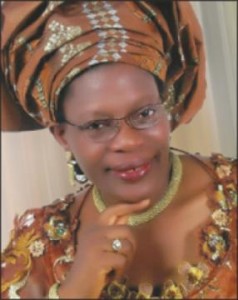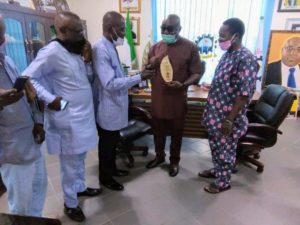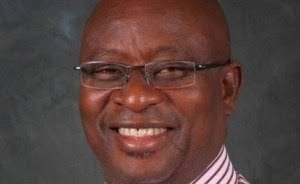RE: EDO TEACHERS KICK AGAINST COMPETENCY TEST – Ogbuagu
By Dr. (Mrs.) Veronica Ogbuagu
The publication at page 12 of the Vanguard of Friday 7th February, 2014 titled “Edo Teachers Kick Against Competency Test”, made my heart skip for Nigerian children and the teaching profession. The stand of the NUT Chairman, Mr. Mike Uhunwangho and the PDP State Chairman Chief Dan Orbih are clear indications that they are trying to politicize this very important issue. I don’t think they mean well to the teaching profession, our children and the education industry.
Education is a priceless legacy of fundamental importance to the individual and society. No nation can make any progress without education. This is a fact recognized everywhere in the world. Even a country as great as the United States of America had to be reminded of this, at the turn of the 1960s when President John F. Kennedy told Americans that “our progress as a nation can be no swifter than our progress in education”.
In a developing country such as ours, we should not be satisfied with the present system of education, as education is closely related with the development of society. There should be a re-examination of the system and definite steps taken to overhaul it.
In Nigeria today a very disturbing and worrisome problem is the declining quality of teachers due to decline in the quality of teacher training. You will agree with me that hardly any learning is taking place in most of our primary schools today across the country because hardly is any teaching being done at that level. Many primary school teachers simply do not know what to teach because they are not more literate than the pupils they are supposed to teach. A child who come under the undesirable influence of an incompetent teacher can have his entire school ruined and may even grow to hate books, teachers and the school.
Let us look at some very serious common mistakes made by some teachers. A teacher was once asked, what is your qualification? She replied, “MCE” instead of “NCE”. She was asked to give the full meaning of “NCE”, she replied, “Natural Certificate in Education” instead of “Nigeria Certificate in Education”. Another teacher was asked, “what do you do for a living?” she replied, “I teaches”. “I am a teacher student.” In the course of teaching, many make serious mistakes: “Jesus turned water into drink.” Another, teaching the alphabets said with all conviction: Big letter “A”, small letter “A”, instead of capital latter “A” and small letter “a”. Many mix up small letters and capital letters when writing. Most of the primary school teachers pronounce “X” and “OX” or “us”.
These days, most teachers abuse the use of abbreviations. For example, they write C.R.S instead of the full meaning, Christian Religious Studies. When teachers are asked to write the full word on the chalkboard, they wrote Christian Religion Study”. Others wrote “Intergrated Science,” instead of Integrated Science”.
The following are common spelling errors made by teachers during teaching practice exercise:
- It is good for us to be jelous/jealous.
- Satify/Satisfy.
- Disrepect/Disrespect.
- Ballons/Balloons.
- Enoironment/Environment.
- Healt/Health.
- Flat/Float.
- Nuresry/ Nursery.
- Easther/Esther.
- Prophesy/Prophesied.
- Shepard/Shepherd.
- Competitor/Competitor.
The following are some questions drawn by a teacher.
- Adam and Eve are obedience to God.
- Isaiah gave the prophecy of to the people of Israel.
- Why did Cain killed his brother?
- Why did God tested Abraham, because God want to test his? _______
- ___________ obeyed God and leaves his father house from Haran to the promised land.
- The reason why child must obey there parents is to avoid ___________
- What the problem s affecting Agriculture in Nigeria?
Reading through most of the application letters, one can say that we have a big problem with the teaching and learning of English Language. The four language skills: listening, speaking, reading and writing are very important. When the first three are impaired, the last which is writing automatically becomes a bunch of rubbish. Though some people are fluent in speaking and very poor in writing, this is as a result of lack of practice.In 2012, the Delta State Government returned some schools to the Catholic Mission. The Mission advertised for teachers. Over five hundred teachers applied to teach in the various schools. Our first task was to short-list applicants. Over 200 copies of application letters submitted to the Mission, were nothing but a hilarious joke. If not seen, one will imagine it is a tale. In these letters, a lot of errors were observed: autographical [spelling] errors, organizational errors, and lack of cohesion. Almost all the letters had no margin, some underlined capital letters, using the informal diction “Dear” in a formal letter, wrong use of tenses, wrong appropriateness of punctuation marks etc.
If any one doubts the authenticity of the above letters, let that person come to me and I will show him/her the original copies with their names and addresses boldly written on them. I hold very dear to my heart the issue of professionalization of teaching. Unlike the medical, legal and other professions, teaching has yet to assume professional status in Nigeria. Two major factors are responsible for this: the teachers and their organizations and the government and the public. Teachers’ organizations in Nigeria must behave more like professional organizations and less like trade unions. To do this they must have a positive code of ethics and introduce a classification system within the group.
We need to professionalize the practice of teaching. Teaching in Nigeria cannot be compared to such ‘true’ professions as medicine and law.
A profession:
- Has a recognized knowledge base;
- Demands rigorous training and certification of its members;
- Foster a culture of consultation and collaboration in the work place;
- Systematically indoctrinates and “encultures” new members;
- Requires that continuous, regular learning be built into the work cycle;
- Has high public accountability, and takes full responsibility for outcomes;
- Internally maintains high standards of practice;
- Has members who make autonomous decisions guided by an agreed-upon canon ethics.
None of these characteristics can be claimed for teaching. How, then, can the practice of teaching be so thoroughly overhauled that it will fill everyone of these criteria and thereby transform teaching into a profession? I believe the time has come for the Teachers Registration Council to work hard to actualize the professionalization of teaching in Nigeria.
First, give teachers a real career. The primary requirement for turning teaching into a career is to offer a highly visible and clearly defined career path, with opportunities, rewards, and advancement for teachers who continue to work in the classroom, teaching children. A career with a clear trajectory offers the opportunity for increased responsibility, salary, and status commensurate with increased skills and demonstrated performance. It also helps ensure greater accountability for all teachers.
The NUT should consider establishing six teaching positions: Chief Instructor, Professional Teacher, Teacher Associate Teacher, Teaching Intern And Instructional Aid. Each position has its own job description, stipulated level of professional training and achievement and licensing requirements.
Every year, we lament the poor performance of candidates in the West African Schools Examination Council [WAEC] exams. We trade blames, we blame teachers, teachers blame government, government blame organized labour and organized labour blame government and we run round circles. If education must improve, the teachers must first be improved. There is no nation that is above her educational system and there is no educational system that is above its teachers. Organizing in-house training for teachers who are poorly prepared from the on-set is a colossal waste of tax payer’s money.
“I feel ashamed and highly discouraged that teachers are refusing to write competency test”. It won’t come as a surprise if one day, students rise up and tell their teachers that they will not sit for examinations in the school system anymore, and that they deserve automatic promotion from one class to the other. Students won’t be the only ones earning grades. Teachers across the nation or in their respective states should begin to earn marks of their own under a new National or State System for Evaluating Teachers.
We are of the opinion that the key to improving the nation’s schools is through improving teacher quality. “They are important because they improve teaching. I don’t know one educator who doesn’t want to improve or get better.” We support evaluations linked to professional development. In fact, Nigerian Legislature should pass a law requiring regular evaluations of teachers. The NUT should put in place policies for judging experienced teachers’ performance.
Teachers who are not meeting expectations or who do not improve would face discipline or termination. “If you value performance, you must have some type of accountability system.” We must as a matter of fact require more accountability from teachers.
The institutions that prepare teachers must re-examine their roles and try to improve the quality of the existing teaching force. Most of the lecturers preparing teachers in the various College of Education and Faculty of Education in our Universities are not trained teachers. You do not give what you do not have. A good teacher training programme is the key to the accomplishment of educational goals. The supply and training of teachers lies at the very heart of the educational process in Nigeria. The Christian Missionaries laid the foundations for teacher training in Nigeria. We must therefore, look to the past and better the future. Improved student learning will take place only when teachers have access to the necessary training, knowledge, skills, working conditions and material resources. For them to have the tools they need, major changes must be made.
To revive our fallen system of education, all hands must be on deck. This will involve the government, the educational agencies and ministry, the parents, the community, the teachers, the heads of schools and the students themselves. Teachers must be respected in our society. Teachers too must respect themselves, teach well, follow the ethics of the profession. We appeal to all our professional colleagues to welcome this new development. “SAY YES TO COMPETENCY TEST.” We want a well-trained, qualified, efficient, satisfied and dedicated crop of teachers in the profession and not mediocres.
Dr. [Mrs.] Veronica .E. Ogbuagu [JP]
Effurun, Delta State




